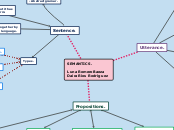Utterance, Sentence and Propositions

By one person before and after / silence.
Ephemeral.
Particular occasion.
- Identified by a specific time or by a specific person.
- Less abstract physical.
- Physical event.
-It's spoken
Don't correspond to facts.
Only true propositions can be known.
False.
True.
Can be.
Situation.
It's remains constant.
- It's a fact.
- The way you perceive the world.
- Describes a state of affairs.
Persons or things.
Types.
Makes a statement or states a fact.
Convey orders.
Ask questions.
Declarative.
Interrogatives.
Imperactives.
- String of words put together by
grammatical rules of a lenguage.
Same Words.
- Has no time or place, but it has
a definitive linguistic form.
Purposes.
- Abstract gramar.
Different orden.
Same orden.
Propositions.
Utterance.
Sentence.
SEMANTICS.
Luna Romero Baeza
Daira Rios Rodriguez

